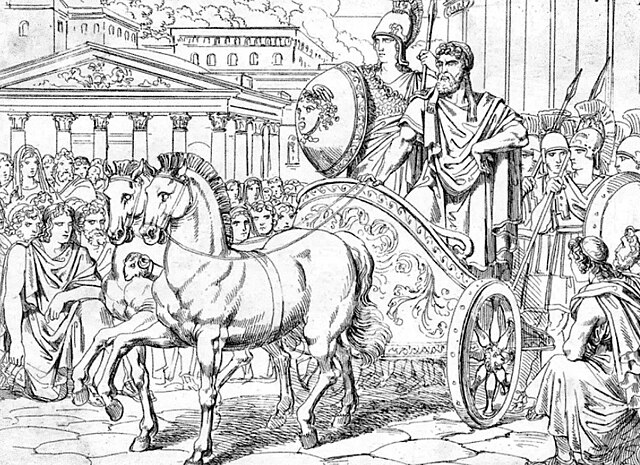Pisistratus was a politician in ancient Athens, ruling as tyrant in the late 560s, the early 550s and from 546 BC until his death. His unification of Attica, the triangular peninsula of Greece containing Athens, along with economic and cultural improvements laid the groundwork for the later pre-eminence of Athens in ancient Greece. His legacy lies primarily in his institution of the Panathenaic Games, historically assigned the date of 566 BC, and the consequent first attempt at producing a definitive version of the Homeric epics. Pisistratus' championing of the lower class of Athens is an early example of populism. While in power, he did not hesitate to confront the aristocracy and greatly reduce their privileges, confiscating their lands and giving them to the poor. Pisistratus funded many religious and artistic programs, in order to improve the economy and spread the wealth more equally among the Athenian people.
Fictitious depiction of Pisistratus from the 19th century
City of ancient Athens and its surrounding towns. The Long Walls shown were not built until the 5th century BC.
Illustration from 1838 by M. A. Barth depicting the return of Pisistratus to Athens, accompanied by a woman dressed as Athena, as described by the Greek historian Herodotus
Men harvesting olives (ca. 520 BC); British Museum, London
Athens is one of the oldest named cities in the world, having been continuously inhabited for perhaps 5,000 years. Situated in southern Europe, Athens became the leading city of Ancient Greece in the first millennium BC, and its cultural achievements during the 5th century BC laid the foundations of Western civilization.
Painting of an idealized reconstruction of the Acropolis and Areios Pagos in Athens, by Leo von Klenze (1846)
The contest of Athena and Poseidon, West Pediment of the Parthenon
The ruins of the Temple of Olympian Zeus, conceived by the sons of Peisistratus
Roman statuette of Athena, copy of the Phidias statue, created for the Parthenon in 447 BC, National Archaeological Museum, Athens








